牛津译林版六年级下册 Unit 2 Good habits 复习课件
文档属性
| 名称 | 牛津译林版六年级下册 Unit 2 Good habits 复习课件 | 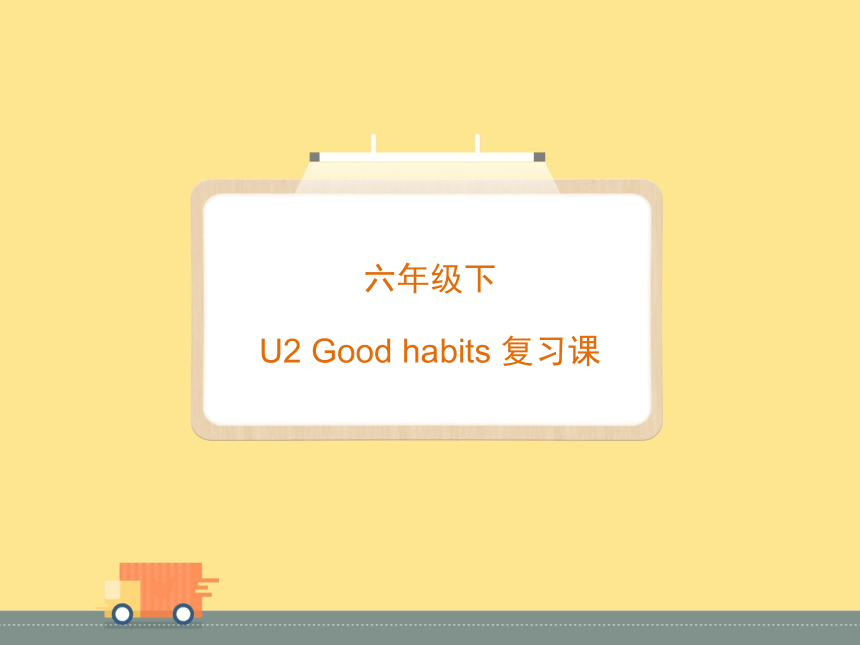 | |
| 格式 | pptx | ||
| 文件大小 | 2.9MB | ||
| 资源类型 | 试卷 | ||
| 版本资源 | 牛津译林版 | ||
| 科目 | 英语 | ||
| 更新时间 | 2021-10-20 09:22:33 | ||
图片预览


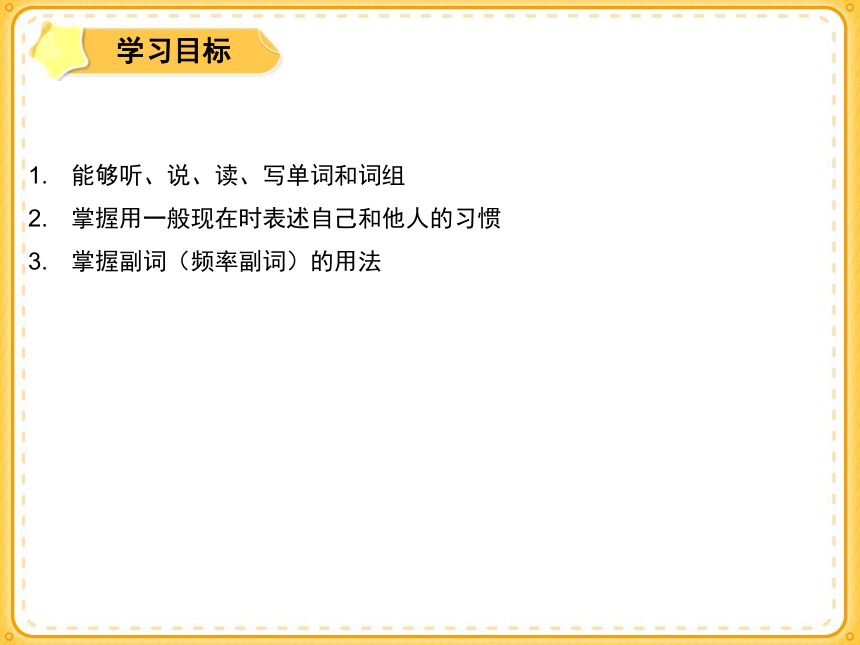
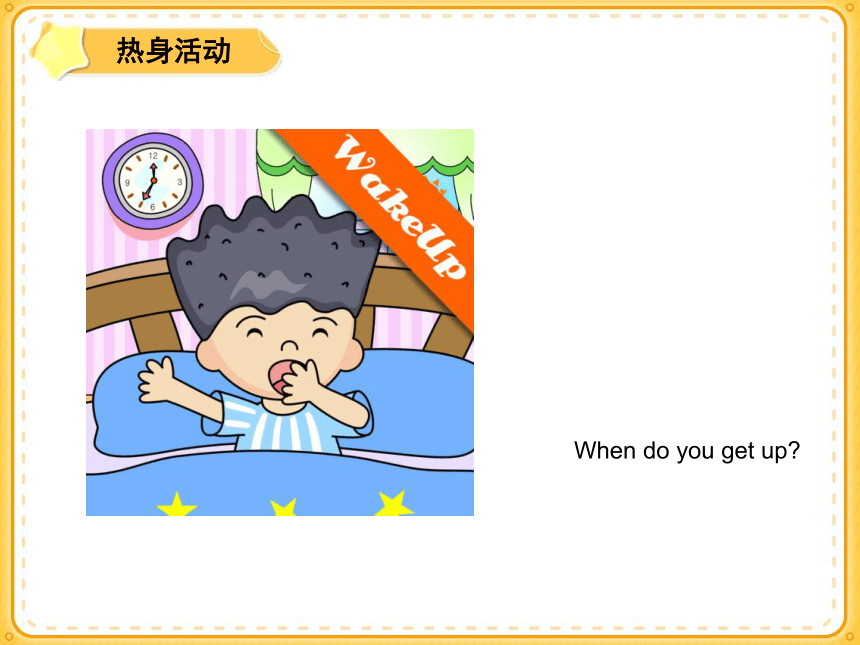
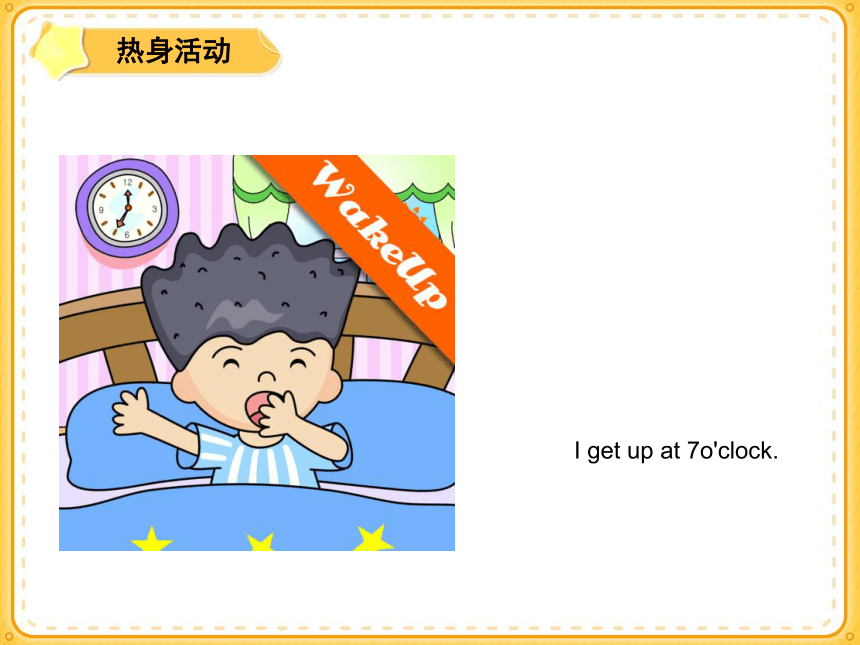

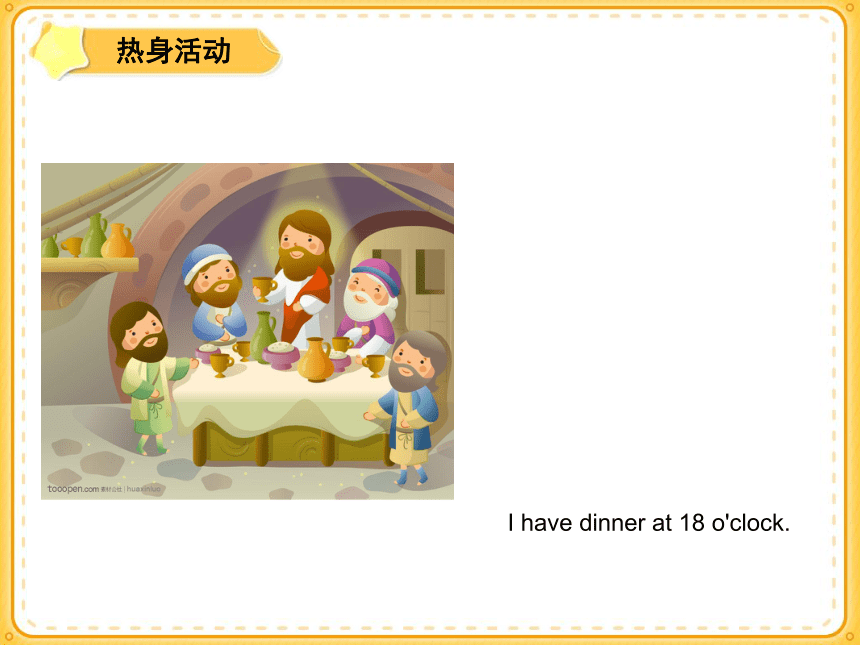
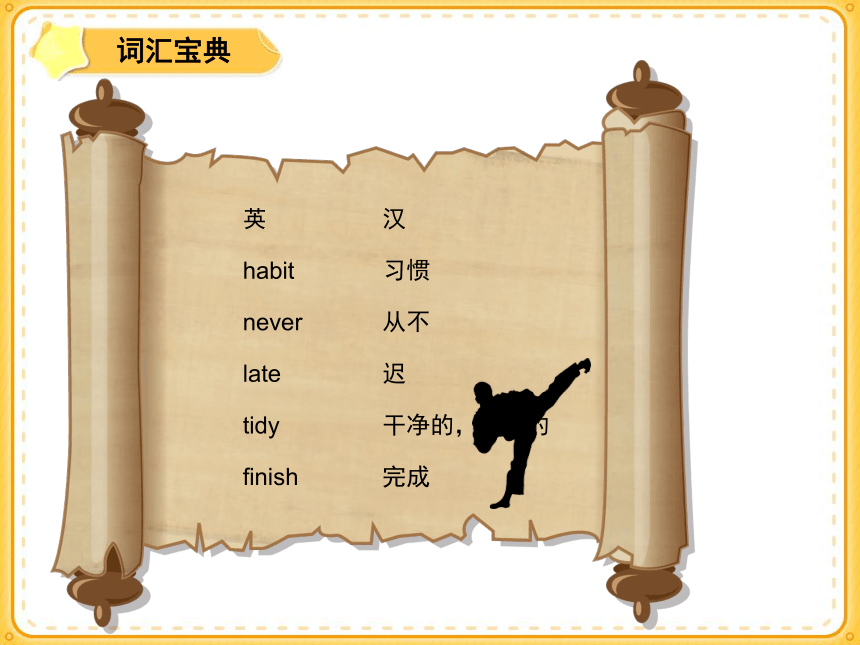
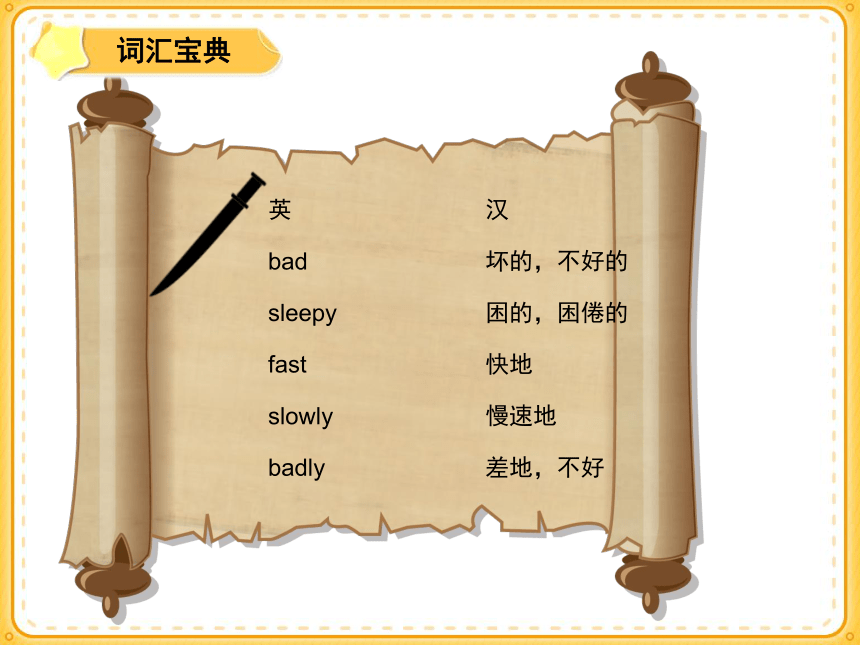
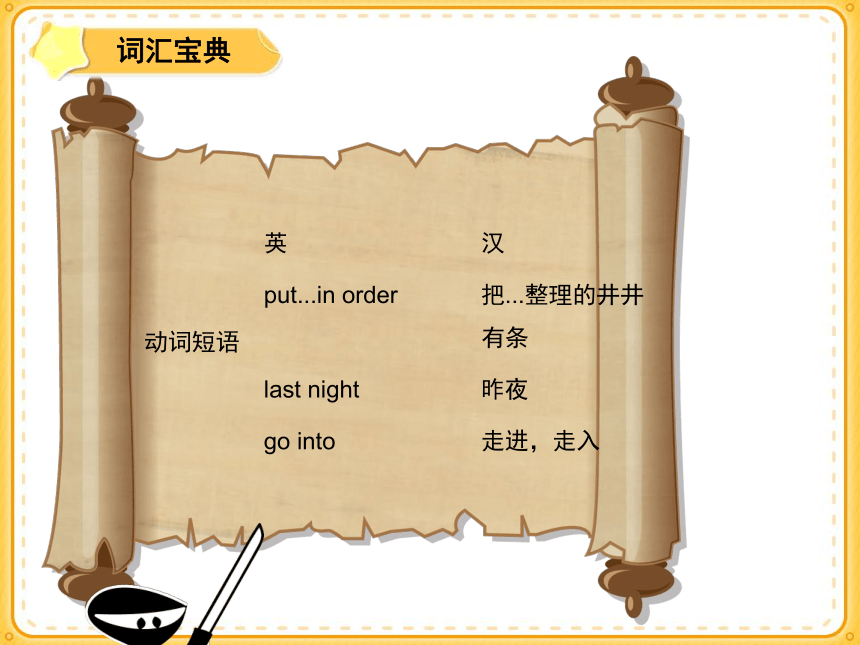
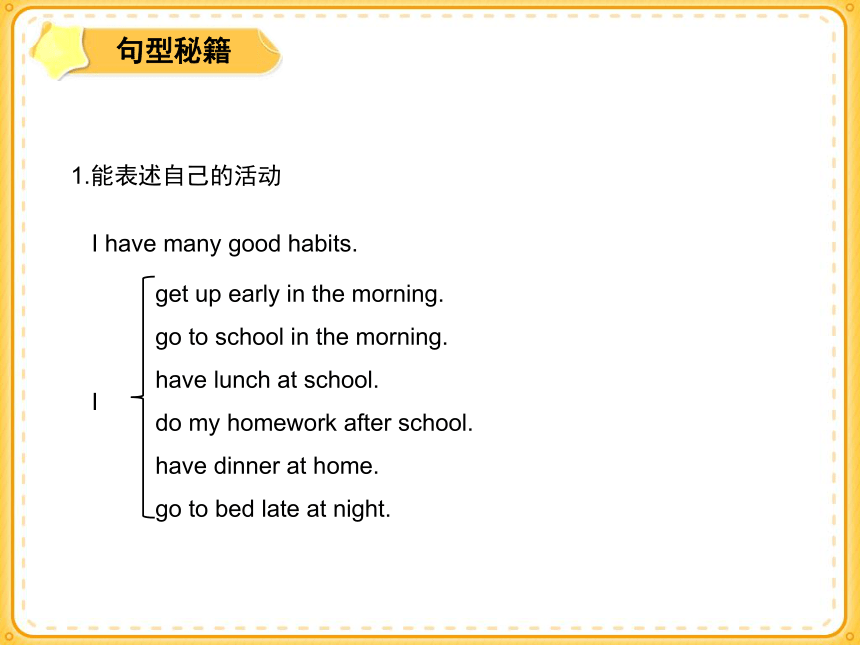

文档简介
(共48张PPT)
六年级下
U2 Good habits 复习课
知识导航
Unit 2
Good habits
能用一般现在时表述自己的习惯
能用一般现在时表述他人的习惯
副词的用法
一般现在时
能够听、说、读、写单词和词组
掌握用一般现在时表述自己和他人的习惯
掌握副词(频率副词)的用法
学习目标
热身活动
When do you get up
热身活动
I get up at 7o'clock.
热身活动
When do you have dinner
热身活动
I have dinner at 18 o'clock.
英 汉
habit 习惯
never 从不
late 迟
tidy 干净的,整齐的
finish 完成
词汇宝典
英 汉
bad 坏的,不好的
sleepy 困的,困倦的
fast 快地
slowly 慢速地
badly 差地,不好
词汇宝典
英 汉
动词短语 put...in order 把...整理的井井有条
last night 昨夜
go into 走进,走入
词汇宝典
1.能表述自己的活动
I have many good habits.
I
句型秘籍
get up early in the morning.
go to school in the morning.
have lunch at school.
do my homework after school.
have dinner at home.
go to bed late at night.
2.能表述他人的活动
He
句型秘籍
gets up early in the morning.
goes to school in the morning.
walks fast in the street.
does my homework after school.
has dinner at home.
goes to bed late at night.
3.频率副词的用法
句型秘籍
I always have breakfast on time.
We usually finish our homework before dinner.
They often do their homework in the evening.
He sometimes feels sleepy in the morning.
1.The children are running .
A.fast B. quickly C.late
单项选择
【答案】A
【解析】本题考察fast用法。
2. The old man is walking .
A.quiet B.slowly C.well
单项选择
【答案】B
【解析】老爷爷走路slowly.
3. Let me show you our home.
A.on B.in C.around
单项选择
【答案】C
【解析】本题考察show sb. around swh..
4.Tina's friend to see her.
A.come B.comes C.coming
单项选择
【答案】B
【解析】本题考察三单的用法。
5. bedroom is this
It's my brother's.
A. What B .who C.Whose
单项选择
【答案】C
【解析】本题考察whose用法。
h_bb t
f_n sh
f_st
t dy
sl_ _py
补全单词
habbi t
fast
tidy
sleepy
补全单词
finish
一般现在时
1 表示事物或人物的特征
2 表示经常性或习惯性的动作
3 表示客观事实,普遍真理
4 表示现在的事实 状态
eg.
The sky is blue.
I am a teacher. You are students. He is a driver. She is a doctor.
Tom is a good boy.
They are busy.
I.1. 表示事物或人物的特征、状态
主语 + be 动词
I.2. 表示经常性或习惯性的动作
eg. I get up at 6:00 every day.
标志性词语
1. 频率副词
always, usually, often, sometimes,
seldom, never
eg. I usually play basketball after school.
2. 时间状语
every day / morning ... at + 几点几分
I.3. 表示客观事实、普遍真理
The earth goes around the sun.
地球绕着太阳转。
I.4. 表示现在的事实、状态
I have an apple.
I can speak English.
II. 肯定句结构
1. 主语 + be + 其它.
am, is, are
eg. I am happy today.
Yaomimg is very tall.
We are good friends.
be
动
词
的用
法
be有am,is,are, I 的后面跟am;
男他女她动物它,张三李四单个他,is 与之紧相连;
其他人称都用are.
2. 主语 + can + 动词原形.
I can play the piano.
He can drive a car.
3. 主语(第三人称) + 动词(单三).
孙悟空
妖怪变形
eg. She wants to be a doctor.
Tom does his homework every day.
The bird flies above my head.
4. 主语(除单三外) + 动词原形.
eg. We usually go to school on foot.
I, we, you, they, 复数
he, she, it, 单个人名, 单数
III. 否定句结构 (not)
1. 主语 + be + not + 其它.
eg. He isn't a worker.
is not = isn't
are not = aren't
2. 主语 + can + not + 动词原形.
eg. I can't play the piano.
3. 主语(第三人称) + doesn't + 动词原形.
does not = doesn't
eg. He doesn't often play chess.
John 不喜欢汉语。
John doesn't like Chinese.
4. 主语(除单三外) + don't + 动词原形.
eg. I don't like studying English.
他们不喜欢面包。
They don't like bread.
= do not
肯
变
否
1. 先找be, 有be + not;
2. 没有be, 再找can, 有can + not变can't;
3. 都没有,看人称。单三借does加not,变doesn't,动词还原形;其他借do加not,变don't.
IV. 一般疑问句
1. Be + 主语 + 其它?
第一人称变第二;
大写小写有变化;
句尾要把 加。
注意
eg. I am a student.---
Are you a student
We are hungry.---
Are you hungry
He is a worker.--
Is he a worker
肯定回答:Yes, 主语 + be.
否定回答:No, 主语 + be not.
Yes, he is.
No, we aren't.
2. Can + 主语+ 动词原形
I can play the piano.
肯定回答:Yes, 主语 + can.
否定回答:No, 主语 + can't.
Can you play the piano?
Yes, I can.
The bird can drink the water.
Can the bird drink the water
No, it can't.
3. Does + 主语(第三人称) + 动词原形
肯定回答:Yes, 主语 + does.
否定回答:No, 主语 + doesn't.
He often plays chess.
Does he often play chess
Yes, he does.
John likes Chinese.
Does John like Chinese
No, he doesn't.
4. Do + 主语(除单三外) + 动词原形
肯定回答:Yes, 主语 + do.
否定回答:No, 主语 + don't.
I like studying English.
Do you like studying English
Yes, I do.
They usually go to school on foot.
Do they usually go to school on foot?
No, they don't.
肯
变
一
般
疑
问
句
1. 先找be, be 提前;
2. 没有be, 再找can, can提前;
3. 都没有,看人称,单三借does,does提前,动词还原形。其它借do, do提前。
V. 特殊疑问句
疑问词 + 一般疑问句?
eg. My bike is in the room.
Where is your bike
My father goes to work by bike.
How does your father go to work
特殊
疑问词
Where How What
Who Which
Whose When
1. She many good habits.
A.has B.have C.had
单项选择
【答案】A
【解析】本题考察单三用法。
2. They go Tina's room.
A.to B.into C.on
单项选择
【答案】B
【解析】本题考察go into 这个知识点。
3. are you
I 'm under the bed.
A.Where B.What C.Who
单项选择
【答案】A
【解析】本题考察特殊疑问词where用法。
4. The boy is doing at school.
A.good B.well C.better
单项选择
【答案】B
【解析】本题考察副词well 用法。
5. We__________home at 4:00.
A. coming B. going C. go
单项选择
【答案】C
【解析】本题考察go home 词组。
1. He the things in doder.
A.puts B.put C.shows
单项选择
【答案】A
【解析】考察put...things in order词组,故选A。
2.You go to bed late.
Ashould B.shouldn't C.could
单项选择
【答案】B
【解析】本题考察提意见。
单项选择
用所给词的正确形式填空
1)I _______ ( go ) to school at seven every day .
2)The girl often ______ ( get ) up at half past five and _______ ( go ) to bed at ten o’clock .
3)3)Some of us _________ ( play ) football after school .
4)He _________ ( study ) English and he ____________
( not study ) French .
5)Lucy and Lily ________ ( like ) apples but Tom ____________( not like ) apples .
【答案】1. go
2. gets; goes
3. play
4. studies; doesn't study
5. like; doesn't
Mother: Good morning, Doctor!
Doctor: Good morning, Mrs Brown. What’s wrong with your son, John
Mother: He looks ill.
Doctor: Hello, John. How do you feel now
John: I don’t feel well, Doctor.
Doctor: Open your mouth, John. Show me your tongue. Say “Ah” .
John: Ah…
Doctor: John has a bad cold, Mrs Brown.
Mother: Can he go to school
Doctor: No. He must be in bed and take some medicine.
Mother: Thank you ,Doctor.
课后作业
根据短文选择最佳答案。
1.The doctor comes to see John _____.
A. in the morning B. in the afternoon C. at night D. in the evening
2.John is _____ .
A. a doctor B. the doctor’s son C. Mrs Brown’s son D. a nurse
3.What’s wrong with John He is _____ .
A. feeling ill B. ill C. very good D. well
4.Can John go to school _____ .
A. Yes, he can. B. No, he can’t. C.I don’t know. D. Yes, he can’t
5.The doctor asks John open his mouth to see his _____ .
A. stomach B. tongue C. teeth D. head
【答案】ACBBB
课堂总结
Unit 2
Good habits
能用一般现在时表述自己的习惯
能用一般现在时表述他人的习惯
副词的用法
一般现在时
一般现在时
1 表示事物或人物的特征
2 表示经常性或习惯性的动作
3 表示客观事实,普遍真理
4 表示现在的事实 状态
六年级下
U2 Good habits 复习课
知识导航
Unit 2
Good habits
能用一般现在时表述自己的习惯
能用一般现在时表述他人的习惯
副词的用法
一般现在时
能够听、说、读、写单词和词组
掌握用一般现在时表述自己和他人的习惯
掌握副词(频率副词)的用法
学习目标
热身活动
When do you get up
热身活动
I get up at 7o'clock.
热身活动
When do you have dinner
热身活动
I have dinner at 18 o'clock.
英 汉
habit 习惯
never 从不
late 迟
tidy 干净的,整齐的
finish 完成
词汇宝典
英 汉
bad 坏的,不好的
sleepy 困的,困倦的
fast 快地
slowly 慢速地
badly 差地,不好
词汇宝典
英 汉
动词短语 put...in order 把...整理的井井有条
last night 昨夜
go into 走进,走入
词汇宝典
1.能表述自己的活动
I have many good habits.
I
句型秘籍
get up early in the morning.
go to school in the morning.
have lunch at school.
do my homework after school.
have dinner at home.
go to bed late at night.
2.能表述他人的活动
He
句型秘籍
gets up early in the morning.
goes to school in the morning.
walks fast in the street.
does my homework after school.
has dinner at home.
goes to bed late at night.
3.频率副词的用法
句型秘籍
I always have breakfast on time.
We usually finish our homework before dinner.
They often do their homework in the evening.
He sometimes feels sleepy in the morning.
1.The children are running .
A.fast B. quickly C.late
单项选择
【答案】A
【解析】本题考察fast用法。
2. The old man is walking .
A.quiet B.slowly C.well
单项选择
【答案】B
【解析】老爷爷走路slowly.
3. Let me show you our home.
A.on B.in C.around
单项选择
【答案】C
【解析】本题考察show sb. around swh..
4.Tina's friend to see her.
A.come B.comes C.coming
单项选择
【答案】B
【解析】本题考察三单的用法。
5. bedroom is this
It's my brother's.
A. What B .who C.Whose
单项选择
【答案】C
【解析】本题考察whose用法。
h_bb t
f_n sh
f_st
t dy
sl_ _py
补全单词
habbi t
fast
tidy
sleepy
补全单词
finish
一般现在时
1 表示事物或人物的特征
2 表示经常性或习惯性的动作
3 表示客观事实,普遍真理
4 表示现在的事实 状态
eg.
The sky is blue.
I am a teacher. You are students. He is a driver. She is a doctor.
Tom is a good boy.
They are busy.
I.1. 表示事物或人物的特征、状态
主语 + be 动词
I.2. 表示经常性或习惯性的动作
eg. I get up at 6:00 every day.
标志性词语
1. 频率副词
always, usually, often, sometimes,
seldom, never
eg. I usually play basketball after school.
2. 时间状语
every day / morning ... at + 几点几分
I.3. 表示客观事实、普遍真理
The earth goes around the sun.
地球绕着太阳转。
I.4. 表示现在的事实、状态
I have an apple.
I can speak English.
II. 肯定句结构
1. 主语 + be + 其它.
am, is, are
eg. I am happy today.
Yaomimg is very tall.
We are good friends.
be
动
词
的用
法
be有am,is,are, I 的后面跟am;
男他女她动物它,张三李四单个他,is 与之紧相连;
其他人称都用are.
2. 主语 + can + 动词原形.
I can play the piano.
He can drive a car.
3. 主语(第三人称) + 动词(单三).
孙悟空
妖怪变形
eg. She wants to be a doctor.
Tom does his homework every day.
The bird flies above my head.
4. 主语(除单三外) + 动词原形.
eg. We usually go to school on foot.
I, we, you, they, 复数
he, she, it, 单个人名, 单数
III. 否定句结构 (not)
1. 主语 + be + not + 其它.
eg. He isn't a worker.
is not = isn't
are not = aren't
2. 主语 + can + not + 动词原形.
eg. I can't play the piano.
3. 主语(第三人称) + doesn't + 动词原形.
does not = doesn't
eg. He doesn't often play chess.
John 不喜欢汉语。
John doesn't like Chinese.
4. 主语(除单三外) + don't + 动词原形.
eg. I don't like studying English.
他们不喜欢面包。
They don't like bread.
= do not
肯
变
否
1. 先找be, 有be + not;
2. 没有be, 再找can, 有can + not变can't;
3. 都没有,看人称。单三借does加not,变doesn't,动词还原形;其他借do加not,变don't.
IV. 一般疑问句
1. Be + 主语 + 其它?
第一人称变第二;
大写小写有变化;
句尾要把 加。
注意
eg. I am a student.---
Are you a student
We are hungry.---
Are you hungry
He is a worker.--
Is he a worker
肯定回答:Yes, 主语 + be.
否定回答:No, 主语 + be not.
Yes, he is.
No, we aren't.
2. Can + 主语+ 动词原形
I can play the piano.
肯定回答:Yes, 主语 + can.
否定回答:No, 主语 + can't.
Can you play the piano?
Yes, I can.
The bird can drink the water.
Can the bird drink the water
No, it can't.
3. Does + 主语(第三人称) + 动词原形
肯定回答:Yes, 主语 + does.
否定回答:No, 主语 + doesn't.
He often plays chess.
Does he often play chess
Yes, he does.
John likes Chinese.
Does John like Chinese
No, he doesn't.
4. Do + 主语(除单三外) + 动词原形
肯定回答:Yes, 主语 + do.
否定回答:No, 主语 + don't.
I like studying English.
Do you like studying English
Yes, I do.
They usually go to school on foot.
Do they usually go to school on foot?
No, they don't.
肯
变
一
般
疑
问
句
1. 先找be, be 提前;
2. 没有be, 再找can, can提前;
3. 都没有,看人称,单三借does,does提前,动词还原形。其它借do, do提前。
V. 特殊疑问句
疑问词 + 一般疑问句?
eg. My bike is in the room.
Where is your bike
My father goes to work by bike.
How does your father go to work
特殊
疑问词
Where How What
Who Which
Whose When
1. She many good habits.
A.has B.have C.had
单项选择
【答案】A
【解析】本题考察单三用法。
2. They go Tina's room.
A.to B.into C.on
单项选择
【答案】B
【解析】本题考察go into 这个知识点。
3. are you
I 'm under the bed.
A.Where B.What C.Who
单项选择
【答案】A
【解析】本题考察特殊疑问词where用法。
4. The boy is doing at school.
A.good B.well C.better
单项选择
【答案】B
【解析】本题考察副词well 用法。
5. We__________home at 4:00.
A. coming B. going C. go
单项选择
【答案】C
【解析】本题考察go home 词组。
1. He the things in doder.
A.puts B.put C.shows
单项选择
【答案】A
【解析】考察put...things in order词组,故选A。
2.You go to bed late.
Ashould B.shouldn't C.could
单项选择
【答案】B
【解析】本题考察提意见。
单项选择
用所给词的正确形式填空
1)I _______ ( go ) to school at seven every day .
2)The girl often ______ ( get ) up at half past five and _______ ( go ) to bed at ten o’clock .
3)3)Some of us _________ ( play ) football after school .
4)He _________ ( study ) English and he ____________
( not study ) French .
5)Lucy and Lily ________ ( like ) apples but Tom ____________( not like ) apples .
【答案】1. go
2. gets; goes
3. play
4. studies; doesn't study
5. like; doesn't
Mother: Good morning, Doctor!
Doctor: Good morning, Mrs Brown. What’s wrong with your son, John
Mother: He looks ill.
Doctor: Hello, John. How do you feel now
John: I don’t feel well, Doctor.
Doctor: Open your mouth, John. Show me your tongue. Say “Ah” .
John: Ah…
Doctor: John has a bad cold, Mrs Brown.
Mother: Can he go to school
Doctor: No. He must be in bed and take some medicine.
Mother: Thank you ,Doctor.
课后作业
根据短文选择最佳答案。
1.The doctor comes to see John _____.
A. in the morning B. in the afternoon C. at night D. in the evening
2.John is _____ .
A. a doctor B. the doctor’s son C. Mrs Brown’s son D. a nurse
3.What’s wrong with John He is _____ .
A. feeling ill B. ill C. very good D. well
4.Can John go to school _____ .
A. Yes, he can. B. No, he can’t. C.I don’t know. D. Yes, he can’t
5.The doctor asks John open his mouth to see his _____ .
A. stomach B. tongue C. teeth D. head
【答案】ACBBB
课堂总结
Unit 2
Good habits
能用一般现在时表述自己的习惯
能用一般现在时表述他人的习惯
副词的用法
一般现在时
一般现在时
1 表示事物或人物的特征
2 表示经常性或习惯性的动作
3 表示客观事实,普遍真理
4 表示现在的事实 状态
